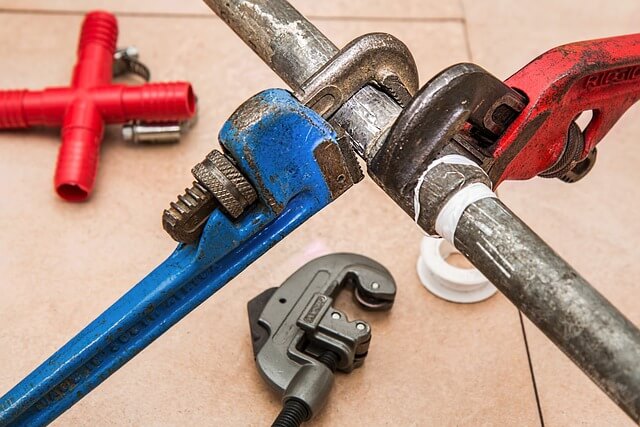Plumbers

Introduction to Plumbing Tools
Plumbing involves the installation, maintenance, and repair of systems that transport water, gas, and waste. It’s an essential service in homes, businesses, and industrial settings. From fixing leaks to installing complex piping systems, plumbing requires a mix of practical skills and technical knowledge.
Here’s what you should know about plumbing:
- Basic Tools: Pipe wrenches, plungers, pliers, and pipe cutters are essential.
- Materials: Copper, PVC, and PEX pipes are commonly used.
- Techniques: Soldering, threading, and sealing connections ensure watertight systems.
- Safety: Proper ventilation and protective gear are crucial for dealing with gases and chemicals.
Plumbing is an indispensable trade for maintaining healthy and functional environments, with tools and techniques that adapt to a range of tasks.
Do Professional Plumbers need to be able to create and read plans?
Are there Advancement Opportunities in Plumbing?
Is it expensive to get a starting toolkit for Plumbing?
Starting a basic plumbing toolkit can range from $200 to $600, depending on the quality and variety of tools. Here’s a quick breakdown:
- Wrenches (adjustable, pipe, basin): $50 – $150
- Plumber’s tape and sealants: $10 – $30
- Pipe cutters: $15 – $50
- Plunger and auger (drain snake): $20 – $100
- Safety gear (gloves, goggles): $30 – $75
- Pliers (groove joint, needle-nose): $30 – $80
This basic setup is sufficient for most common plumbing jobs and can be expanded as you grow in your profession.
Essential Tools for Plumbing
Plumbing requires a variety of specialized tools for handling pipes, fittings, and fixtures. Here are the essential tools for plumbing:
- Pipe Wrenches: For gripping and turning pipes, essential for fitting and removing pipes.
- Plunger: A must-have for clearing clogs in sinks and toilets.
- Pipe Cutter: Used to cut copper and plastic pipes cleanly and efficiently.
- Plumber’s Tape (Teflon Tape): Seals threaded pipe connections to prevent leaks.
- Basin Wrench: Great for tightening nuts and bolts in hard-to-reach areas.
- Adjustable Pliers (Groove Joint): Ideal for gripping, turning, and tightening.
- Drain Snake (Auger): Useful for clearing blockages in drain pipes.
- Hacksaw: Used to cut metal and plastic pipes.
- Plumber’s Torch: Used for soldering copper pipes together.
- Level: Ensures pipes are installed straight and true for proper drainage.
These tools are fundamental for both DIY plumbing projects and professional plumbing work.
Safety Tools for Plumbing Applications?
Educational Resources for Plumbing
Here are some educational resources for plumbing, organized by skill level:
Beginner:
- The Family Handyman – Offers basic plumbing tutorials and DIY advice for beginners. Visit Site.
- YouTube Channels – Many beginner-friendly plumbing tutorials are available on channels like “This Old House.”
Intermediate:
- Plumber Training Center – Provides online resources and training videos for intermediate learners. Visit Site.
- Khan Academy – Basic courses on fluid dynamics and pressure can be useful. Visit Site.
Advanced/Certification:
- National Inspection Testing and Certification (NITC) – Offers certification programs for professional plumbers. Visit Site.
- Plumbers Union Training Programs – Trade-specific training and certification options. Check with your local union for details.
These resources offer a mix of basic knowledge, technical skills, and professional development opportunities for plumbers at all stages of their careers.
Are there Plumbing Communities or blogs that could be helpful?
Here are some helpful plumbing communities and blogs:
- Plumbing Zone – A professional plumbing forum for experts to share tips, troubleshooting advice, and industry news. Visit Site
- Plumber Magazine – Features articles and discussions about plumbing techniques, tools, and business insights. Visit Site
- Reddit’s r/Plumbing – An active community of plumbers and DIYers sharing advice and problem-solving tips. Visit Site
- The Plumber.com Blog – Offers resources for both beginners and professionals, including tutorials and news. Visit Site
These platforms provide helpful insights for both novice and experienced plumbers.
Frequently Asked Questions (FAQ)
-
What are the most essential tools for a plumber? Basic plumbing tools include pipe wrenches, pipe cutters, pliers, plungers, and augers. For more advanced work, you’ll need a propane torch, hacksaws, and a drain snake.
-
Do plumbers need certifications? Yes, most regions require plumbers to be licensed, which involves passing an exam and completing an apprenticeship.
-
Can plumbing be done as a DIY project? Simple tasks like unclogging drains or fixing a leaky faucet can be done by DIYers. Complex issues should be handled by professionals.
-
How can I find work as a plumber? Networking, joining plumbing associations, or using job boards like Indeed and specialized sites such as Plumbing Zone can help.
-
How much does a beginner’s toolkit cost? A basic plumbing toolkit costs around $300 to $700, depending on the quality and variety of tools.
Ad Notice:
ToolFinder is a site as a free service. We do not charge a fee, and so we have ads on our site to help support development cost and basic time input.
We may also have links on our site to others for products - known as affiliate links - you will Not pay more by utilizing these links, but the merchant would provide ToolFinder a fee for the referral. As an Amazon Associate I earn from qualifying purchases.

